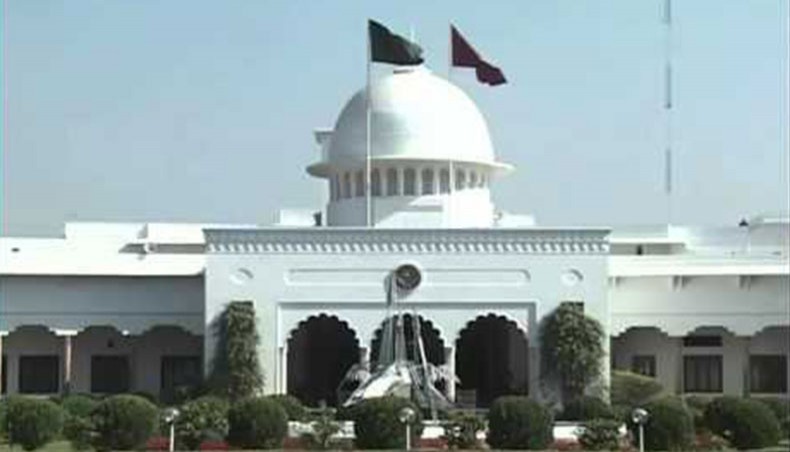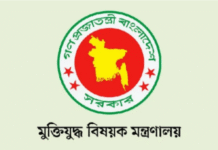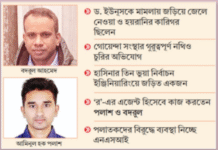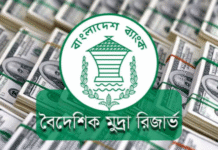The president, Abdul Hamid, on Monday initiated a move to talks with registered political parties on the reconstitution of the Election Commission and invited five parties including the Bangladesh Nationalist Party to separate talks in the first phase.
The series of talks with the registered political parties would start with BNP that was invited to Bangabhaban on December 18.
In first phase, five political parties have been invited to Bangabhaban for talks, according to president’s press secretary Joynal Abedin.
The president also invited to separate meetings the Jatiya Party faction led by HM Ershad, on December 20, the Liberal Democratic Party and the Krishak Sramik Janata League on December 21 and the Jatiya Samajtantrik Dal faction led by information minister Hasanul Haq Inu on December 22.
Other registered political parties would be invited in phases, Joynal said.
BNP senior joint secretary general Ruhul Kabir Rizvi told New Age that they had received the invitation to the talks on appointment of chief election commissioner and other election commissioners.
He said that the invitation signed by secretary to the president Shampad Barua requested BNP to attend the meeting at 4:30pm on December 18.
The invitation also requested BNP to send the names of not more than 10 representatives to Bangabhban by December 15 for the talks, Rizvi said.
A member of Bangabhaban staff carried the invitation, addressed to BNP secretary general Mirza Fakhrul Islam, to BNP central office at about 2:30pm.
Earlier on November 20 and 23, BNP sought an appointment with the president to place to him BNP chairperson Khaleda Zia’s proposal for the reconstitution of the commission based on consensus in consultation with the registered political parties.
On December 6, Rizvi and BNP vice-chairman Ruhul Alam Chowdhury handed over to the assistant military secretary to the president two copies of Khaleda’s proposals as the party failed to get an appointment with the president.
Khaleda unveiled the proposals for reconstituting and strengthening the commission at a hotel in the capital on November 18 as the tenure of the chief election commissioner would expire in February 2017.
She proposed that the commission should be formed based on consensus among registered political parties through a five-member search committee to be formed based on consensus following discussions with the registered parties.
She also suggested strengthening the commission amending the Representation of the People Order 1972 and setting up a full-fledged secretariat of the commission with financial autonomy.
She proposed amendment to the 1972 order reinstating the Defence Services of Bangladesh as law enforcing agency.
Khaleda, also former prime minister, elaborated the proposals for ensuring free, fair and credible elections.
She suggested that the search committee would be formed with a retired chief justice, as its convener, and a retired judge of the Appellate Division, a retired secretary, an educationist or a widely respected eminent citizen and a widely respected senior woman, as its members.
People who had ever held any office of profit in the service of the republic, a retired cabinet secretary or a retired secretary who had worked at the Prime Minister’s Office at any time would be eligible to be neither a member of the search committee nor the chief election commissioner.
According to the proposals the president would form the search committee based on consensus among the political parties who would recommend two people for each of the posts on the committee in writing to the president.
A former head of any constitutional body, a non-partisan retired secretary or an eminent citizen would be eligible to be the chief election commissioner, said the proposals.
Khaleda proposed that four people, including a woman, could be appointed as election commissioners from retired civil, military and judicial officers and civil society.
Each party would recommend two individuals for each post in the commission to the president.
The president will send the recommended names to the search committee for choosing two people for each post in the commission and the President will make the final appointment to the commission, said the proposals.
The series of talks with the registered political parties would start with BNP that was invited to Bangabhaban on December 18.
In first phase, five political parties have been invited to Bangabhaban for talks, according to president’s press secretary Joynal Abedin.
The president also invited to separate meetings the Jatiya Party faction led by HM Ershad, on December 20, the Liberal Democratic Party and the Krishak Sramik Janata League on December 21 and the Jatiya Samajtantrik Dal faction led by information minister Hasanul Haq Inu on December 22.
Other registered political parties would be invited in phases, Joynal said.
BNP senior joint secretary general Ruhul Kabir Rizvi told New Age that they had received the invitation to the talks on appointment of chief election commissioner and other election commissioners.
He said that the invitation signed by secretary to the president Shampad Barua requested BNP to attend the meeting at 4:30pm on December 18.
The invitation also requested BNP to send the names of not more than 10 representatives to Bangabhban by December 15 for the talks, Rizvi said.
A member of Bangabhaban staff carried the invitation, addressed to BNP secretary general Mirza Fakhrul Islam, to BNP central office at about 2:30pm.
Earlier on November 20 and 23, BNP sought an appointment with the president to place to him BNP chairperson Khaleda Zia’s proposal for the reconstitution of the commission based on consensus in consultation with the registered political parties.
On December 6, Rizvi and BNP vice-chairman Ruhul Alam Chowdhury handed over to the assistant military secretary to the president two copies of Khaleda’s proposals as the party failed to get an appointment with the president.
Khaleda unveiled the proposals for reconstituting and strengthening the commission at a hotel in the capital on November 18 as the tenure of the chief election commissioner would expire in February 2017.
She proposed that the commission should be formed based on consensus among registered political parties through a five-member search committee to be formed based on consensus following discussions with the registered parties.
She also suggested strengthening the commission amending the Representation of the People Order 1972 and setting up a full-fledged secretariat of the commission with financial autonomy.
She proposed amendment to the 1972 order reinstating the Defence Services of Bangladesh as law enforcing agency.
Khaleda, also former prime minister, elaborated the proposals for ensuring free, fair and credible elections.
She suggested that the search committee would be formed with a retired chief justice, as its convener, and a retired judge of the Appellate Division, a retired secretary, an educationist or a widely respected eminent citizen and a widely respected senior woman, as its members.
People who had ever held any office of profit in the service of the republic, a retired cabinet secretary or a retired secretary who had worked at the Prime Minister’s Office at any time would be eligible to be neither a member of the search committee nor the chief election commissioner.
According to the proposals the president would form the search committee based on consensus among the political parties who would recommend two people for each of the posts on the committee in writing to the president.
A former head of any constitutional body, a non-partisan retired secretary or an eminent citizen would be eligible to be the chief election commissioner, said the proposals.
Khaleda proposed that four people, including a woman, could be appointed as election commissioners from retired civil, military and judicial officers and civil society.
Each party would recommend two individuals for each post in the commission to the president.
The president will send the recommended names to the search committee for choosing two people for each post in the commission and the President will make the final appointment to the commission, said the proposals.
Source: New Age










